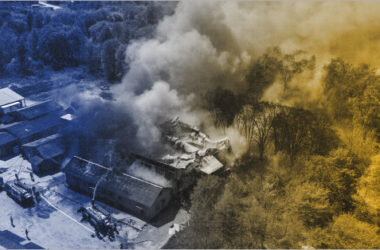Fire Insurance is an essential aspect of risk management for companies in India. With the increasing number of fire accidents in commercial establishments, it has become imperative for companies to protect themselves from the financial losses that such incidents can cause. Fire Insurance Policies offer coverage against damage to property, loss of inventory, and other related expenses arising from fire accidents. By purchasing a Fire Insurance Policy, companies can protect themselves against financial losses caused by fire and other covered perils. It is essential to choose a policy that meets the specific needs of the company and to carefully review the policy documents to ensure that the coverage provided is adequate.
Overview of Fire Insurance in India
From a business insurance point of view, Fire Insurance is a type of insurance policy that provides financial protection to companies in the event of a fire. In India, Fire Insurance is an essential part of risk management for businesses, as fires can cause significant damage to property, equipment, and inventory.
Fire Insurance Policies in India typically cover losses caused by fire, lightning, explosion, and implosion. Some policies may also cover losses caused by natural disasters, such as earthquakes and floods. However, it is important to note that coverage may vary depending on the policy and the insurance company.
In India, Fire Insurance Policies are offered by both public and private insurance companies. The Insurance Regulatory and Development Authority of India (IRDAI) regulates the insurance industry in India and ensures that insurance companies comply with the necessary regulations and guidelines. When purchasing a Fire Insurance Policy, companies should carefully consider their insurance needs and choose a policy that provides adequate coverage. It is important to read the policy documents carefully and understand the terms and conditions of the policy, including the exclusions and deductibles.
Types of Fire Insurance Policies
Fire Insurance Policies in India can be broadly classified into the following categories:
1. Standard Fire and Special Perils Policy
The Standard Fire and Special Perils Policy (SFSP Policy, in short) is a comprehensive insurance product designed to provide coverage against a range of risks associated with property damage. This policy combines protection against standard fire hazards with additional coverage for special perils, offering a broader scope of security to policyholders. Standard fire risks include damages caused by fire, lightning, and explosion, while special perils encompass a wider array of potential threats such as floods, earthquakes, storms, riots, and malicious damage. This policy is crucial for property owners, as it ensures financial compensation for the repair or replacement of damaged structures and contents.
Under the Standard Fire and Special Perils Policy, the following Perils in Insurance are covered:
· Fire
· Strike, riot, and malicious damage
· Damage to aircraft
· Lightning
· Implosion/Explosion
· Landslide and subsidence
· Storms, tornadoes, typhoons, cyclones, hurricanes, tempests, floods and inundations
· Impact damage
· Automatic Sprinkler Installation leakage
· Tanks, apparatus, and pipes burst or overflow.
· Testing operation of missiles
· Bush Fire
2. Valued Policy: The value of a subject is decided by a Valued Policy. If the subject matter has been destroyed or damaged, the insurer will pay a predetermined sum based on this value. The agreed-upon value may be larger or less than the market price. This insurance is designed for goods and properties whose precise value cannot be ascertained after a damage or loss. This category usually contains works of art, jewels, paintings and crafts.
3. Specific Policy: This Fire Insurance Policy will pay up to the specified amount of risk mentioned in the schedule. In the event of a fire, the insurer will pay for losses less than the stipulated amount, up to the sum insured.
4. Comprehensive Policy: A comprehensive policy safeguards the insured from fire, lightning, burglary, explosion, labour disputes, rioting and other perils in insurance. Because a single policy covers multiple risks, a comprehensive policy is generally recommended.
5. Floater Policy: This policy is aimed primarily at import and export companies. The floater policy meaning is used to cover a company’s items that are dispersed across the country, as long as they belong to the same owner. The premium charged is equivalent to the average premium that would have been levied if a specific policy covering all of these commodities had been purchased.
6. Replacement Policy: In this Fire Insurance Policy, insurance companies guarantee compensation for loss depending on the market value of the insured property. As a result, the amount to be reimbursed is calculated after considering the property’s depreciation. The policy ensures that the payment is based on the replacement cost. So, the new asset will have the same cost as the old one. The compensation is based on the market value of the replacement assets, therefore it is replaced at no additional expense.
7. Consequential Loss Policy: It is often observed that factory operations get halted due to a fire. The fixed costs remain constant and output decreases. A consequential loss policy can provide coverage for all of the above losses. This policy compensates the policyholder for lost profits, by determining compensation according to the loss of sale.
8. Declaration policy: When stock values/stocks vary often, this method is important for avoiding underinsurance. As per the agreement between the insurance provider and the insured, stock values have to be declared regularly (usually monthly). The premium is derived using the average stock values at the end of the policy year. Any excess premiums are refunded to the policyholder.
Exclusions in Fire Insurance Policies
Fire Insurance Policies are designed to provide financial protection to companies in case of fire-related damages to their property. However, it is important to note that not all damages caused by fire are covered under the policy. There are certain exclusions that companies must be aware of before purchasing Fire Insurance.
· Deliberate Act
Fire Insurance Policies do not cover damages caused by a deliberate act of the insured or any person acting on their behalf. If it is found that the fire was intentionally set by the insured or someone acting on their behalf, the insurance company will not provide coverage for the damages.
· War and Nuclear Risks
Fire Insurance Policies do not cover damages caused by war, invasion, acts of foreign enemies, hostilities, civil war, rebellion, revolution, insurrection, military or usurped power, or any direct or indirect consequences of any of these events. Additionally, damages caused by nuclear risks are also excluded from the policy.
· Wear and Tear
Fire Insurance Policies do not cover damages caused by wear and tear, gradual deterioration, or any other form of depreciation. If the damage is caused by the natural ageing process of the property, it will not be covered under the policy.
· Consequential Loss
Fire Insurance Policies do not cover consequential losses, which are losses that occur as a result of the fire but are not directly caused by it. For example, if a fire causes a company to shut down its operations for a week, resulting in lost profits, the Fire Insurance Policy will not cover the lost profits.
· Electrical or Mechanical Breakdown
Fire Insurance Policies do not cover damages caused by electrical or mechanical breakdown unless it is caused by fire or lightning. If the damage is caused by a malfunctioning machine or faulty wiring, it will not be covered under the policy.
Why is Fire Insurance Important for Companies?
Fire Insurance is crucial for companies in India for several reasons. Firstly, India is prone to various natural and man-made disasters, including fires, which can lead to significant financial losses for businesses. Fire Insurance provides a safety net by covering the cost of damage or destruction to property, equipment, and inventory caused by fire accidents.
Secondly, businesses often invest substantial capital in their physical assets, such as buildings, machinery, and goods. Fire Insurance helps protect these assets, ensuring that companies can recover financially in the event of a fire-related incident. This is particularly important for small and medium-sized enterprises (SMEs) that may find it challenging to absorb the financial impact of a major loss.
Thirdly, the Standard Fire and Special Perils Policy in India not only covers standard fire risks but also extends coverage to special perils like floods, earthquakes, and riots. This broadens the scope of protection for businesses, addressing a range of potential threats that could lead to property damage.
Moreover, Fire Insurance is often a prerequisite for securing business loans and leases. Lenders and landlords may require proof of insurance to mitigate their own risks, making it an essential component for business operations and growth. To sum up, Fire Insurance is important for companies in India as it provides financial security, helps businesses recover from losses, and safeguards against a variety of risks that could otherwise jeopardize their continuity and prosperity.
Frequently Asked Questions
1. Is it compulsory for companies to have Fire Insurance in India?
No, it is not compulsory for companies to have Fire Insurance in India. However, it is strongly recommended that businesses protect themselves against any potential losses due to fire accidents by purchasing a fire insurance policy.
2. How is the Fire Insurance premium calculated for Indian companies?
The Fire Insurance premium for Indian companies is calculated based on several factors, including the value of the property insured, the type of business, the location of the property, and the risk factors associated with the property. The premium may also vary depending on the coverage and add-ons selected by the company.
3. Explain the typical claim process in a Fire Insurance Policy for Companies.
When a fire incident occurs, the first step is to inform the insurance company immediately. The insurer will then appoint a surveyor to assess the extent of the damage. The surveyor will investigate the cause of the fire and determine the amount of loss incurred. The policyholder must provide all the necessary documents to the surveyor, including the fire brigade report, inventory of damaged goods, and other relevant documents.
Once the surveyor completes the assessment, the insurer will process the claim settlement. The settlement amount will be based on the sum insured and the extent of the loss. The policyholder will receive the settlement amount after deducting the excess amount, if any. Companies need to understand the claim settlement procedure before purchasing a Fire Insurance Policy. This will help them to file a claim in a timely and efficient manner, ensuring that they receive the settlement amount as soon as possible.
Recent Update
MP Harda Factory Fire: 1 1 killed, 200 injured in MP fireworks unit blasts; 3 held
According to officials cited by news agency PTI, at least eleven individuals lost their lives, and numerous others sustained injuries following an explosion followed by a fire at a firecracker factory in Harda, Madhya Pradesh, on Tuesday. The incident took place in the Bairagarh area on Magardha road, located on the outskirts of Harda town, roughly 150 km away from Bhopal, the state capital.
Videos shared on social media showcased the severity of the fire, featuring sporadic explosions and individuals evacuating the premises








